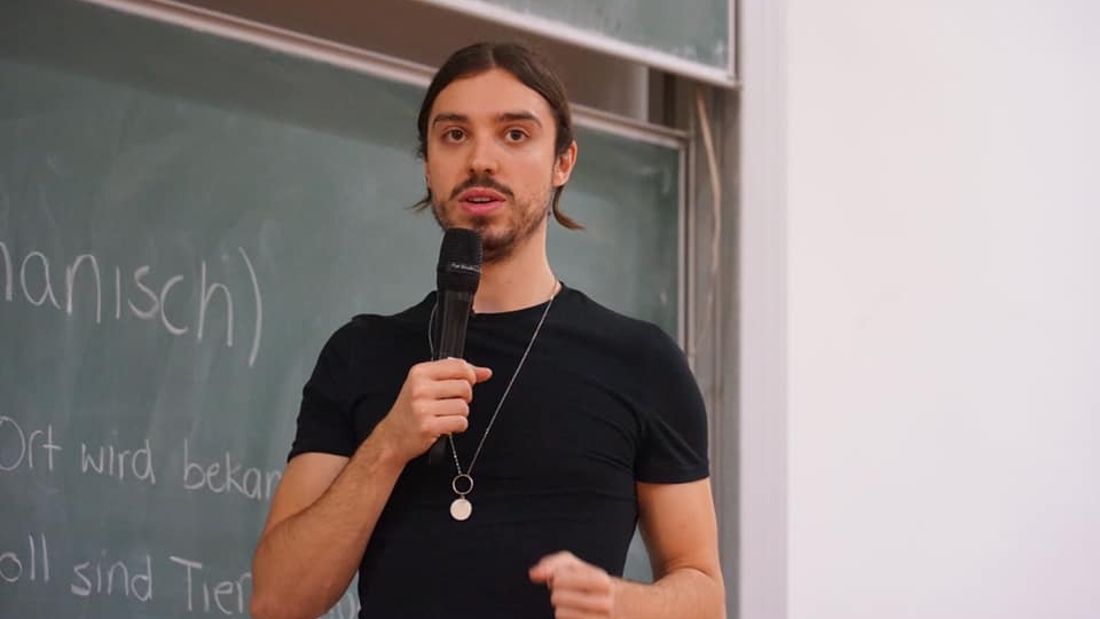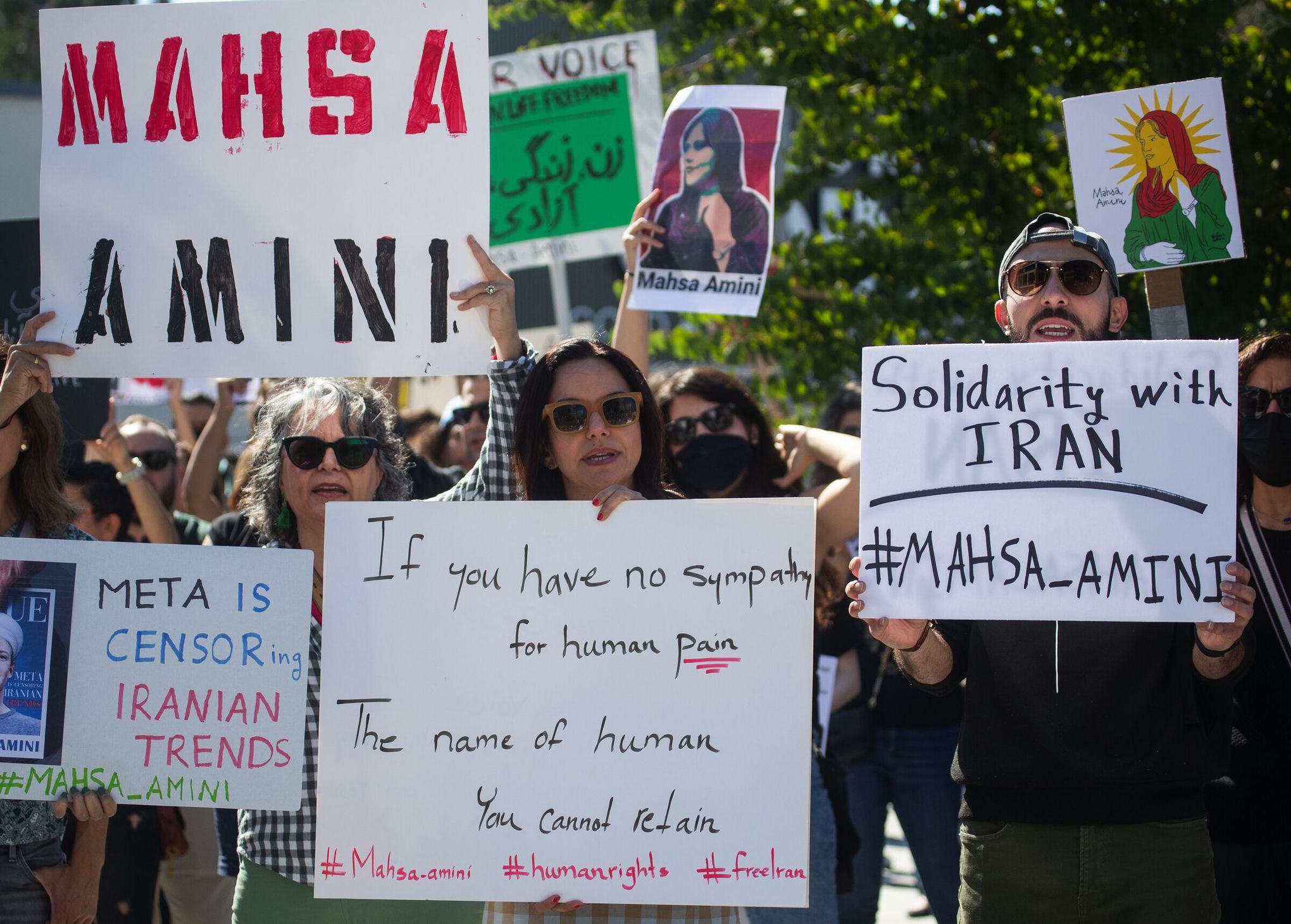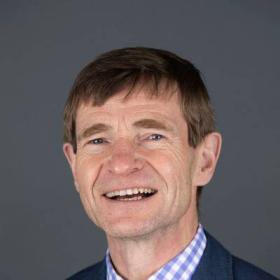A guest post from UWT Alum Lucas Waggoner
Ed Winters — known worldwide for his extensive efforts as a vegan educator, an author, and as a public speaker — is giving a talk on ethics and veganism. Presented as part of the guest speaker series for TPHIL 361 Ethics in Society, the talk will be held virtually at UW Tacoma on February 28, 2023 (Zoom link),  starting at 8:00 am.
starting at 8:00 am.
An outspoken advocate for animal rights, “Earthling Ed,” has spoken across the globe and on virtually every platform imaginable. While he found popularity and notoriety initially through his early lecture called “You Will Never Look at Your Life Again,” he has since taught ethics courses at Harvard University and given numerous Ted talks.
Most of his work follows a consistent and steady theme: evaluating the classical arguments given opposing veganism as a philosophy to test their merits. One-by-one, he presents each argument against veganism. He then examines it to determine whether, under proper scrutiny — often by way of analogy — the argument possesses real merits. Through this method, he has led countless people in his audiences to accepting a vegan lifestyle.
Ed Winters is also well-known for his extremely successful 2022 book, This Is Vegan Propaganda: (And Other Lies the Meat Industry Tells You). Beyond challenging common misconceptions about veganism, the book also discusses an element of the production of meat and other animal products that is rarely discussed in conversations about veganism: the human cost in production. This includes issues such as dangerous working conditions, pollution in primarily lower-income areas, and all manner of abuse from supervisors.
The book, like Winters’ other work, is deeply rooted in ethics. “Veganism”, he explains, “is an ethical stance against needless animal exploitation — it’s not specifically about diet.” It is more of “a social justice issue that recognizes that non-human animals deserve autonomy, moral consideration and the recognition that their lives are far more valuable than the reasons we use to justify exploiting them” (p. 12). Every dimension of Winters’ work highlights questions of a person’s ethical obligations to both animals and nature. Typically, when trying to expose any flaws in the logic for anti-vegan argumentation, he questions whether the positions they hold are viable in a moral sense.
One of his more compelling arguments is the connections he draws between the aforementioned human cost and the nature of animal suffering within the factory farm system. Namely, he discusses how both the exploitation and abuse of humans working at farms, like that of animals, is systemic. The abuses aren’t isolated cases — they aren’t mere aberrations. The suffering is inherent to the way the system functions. The modern system of factory farming exists because of the suffering of both the animals being bred and slaughtered, as well as the humans abused and exploited in those processes.
I encourage you to take the opportunity to hear this provocative and engaging speaker.
Lucas Waggoner is a UWT alum, writer, and English teacher at the Hebrew Academy of Cleveland
 On January 11th, Dee Sonntag, who was recently elected to the Tacoma Municipal Court, visited us. Dee graduated magna cum laude in 2013 with a degree in Politics, Philosophy, and Economics. While a student, she started the Pre-Law Society, then was selected to be her class’s Commencement Speaker. Post graduation, Dee attended the University of Washington School of Law, then worked for both the Seattle City Attorney’s Office and the Pierce County Department of Assigned Counsel. A year ago she was elected to the Tacoma Municipal Court.
On January 11th, Dee Sonntag, who was recently elected to the Tacoma Municipal Court, visited us. Dee graduated magna cum laude in 2013 with a degree in Politics, Philosophy, and Economics. While a student, she started the Pre-Law Society, then was selected to be her class’s Commencement Speaker. Post graduation, Dee attended the University of Washington School of Law, then worked for both the Seattle City Attorney’s Office and the Pierce County Department of Assigned Counsel. A year ago she was elected to the Tacoma Municipal Court. Prior to Dee’s visit, last November 16th, NIck Brooks came to campus to talk with the UWT community. Nick graduated a couple of years ago with a degree in Politics Philosophy and Economics. Before UWT, Nick served in the Air Force for 21 years. Since graduation, he’s been active in the non-profit community, and has served on community boards such as with the Tacoma Pierce County Black Collective, and the historical preservation group Buffalo Soldiers of Seattle. Nick also has long experience as a entrepreneur and property developer. Nick is also active as a father of five, and a coach of various youth sports teams.
Prior to Dee’s visit, last November 16th, NIck Brooks came to campus to talk with the UWT community. Nick graduated a couple of years ago with a degree in Politics Philosophy and Economics. Before UWT, Nick served in the Air Force for 21 years. Since graduation, he’s been active in the non-profit community, and has served on community boards such as with the Tacoma Pierce County Black Collective, and the historical preservation group Buffalo Soldiers of Seattle. Nick also has long experience as a entrepreneur and property developer. Nick is also active as a father of five, and a coach of various youth sports teams.
 starting at 8:00 am.
starting at 8:00 am.








 Andre Jimenez, a Law and Policy major, received an honorable mention for his paper, “Freedom Isn’t Free: Why Pierce County Needs to Move Beyond a Cash Bail System.”
Andre Jimenez, a Law and Policy major, received an honorable mention for his paper, “Freedom Isn’t Free: Why Pierce County Needs to Move Beyond a Cash Bail System.”


 contained in his forthcoming book Humanitarianism Beyond the Human: Interventions with Animals (University of Minnesota Press). Prof. Meiches presentation discussed the contributions of rats to landmine clearance operations and the role goats and cows play in addressing chronic hunger and malnutrition. He argues that nonhuman animals should be understood as humanitarian actors and, consequently, he calls for a shift in the focus of humanitarian intervention from exclusively human interest to broader, ecological concerns.
contained in his forthcoming book Humanitarianism Beyond the Human: Interventions with Animals (University of Minnesota Press). Prof. Meiches presentation discussed the contributions of rats to landmine clearance operations and the role goats and cows play in addressing chronic hunger and malnutrition. He argues that nonhuman animals should be understood as humanitarian actors and, consequently, he calls for a shift in the focus of humanitarian intervention from exclusively human interest to broader, ecological concerns.

 Thursday evening, March 14th, students in Ben Meiches’s TPOLS 275 Urban Debate class hosted members of PLU’s debate club. The result? A rousing debate over a proposal to increase the salaries of public school teachers by 50 percent.
Thursday evening, March 14th, students in Ben Meiches’s TPOLS 275 Urban Debate class hosted members of PLU’s debate club. The result? A rousing debate over a proposal to increase the salaries of public school teachers by 50 percent.

